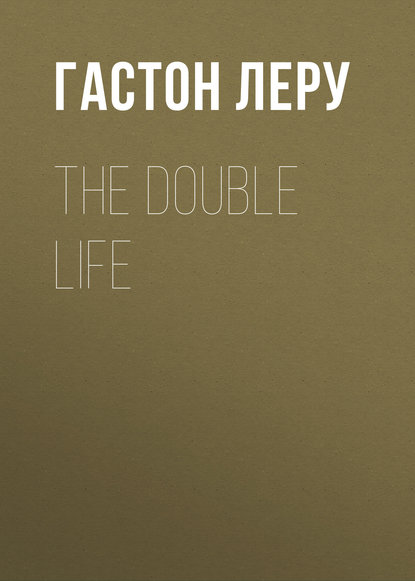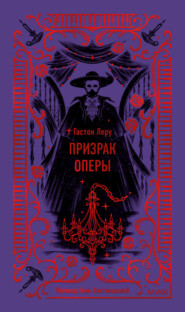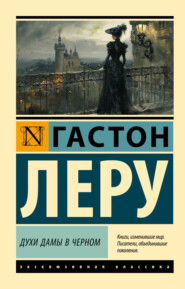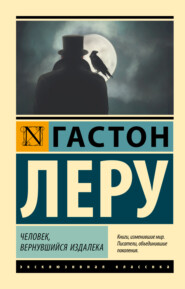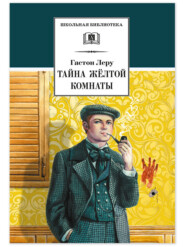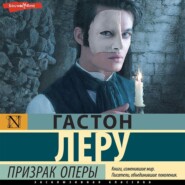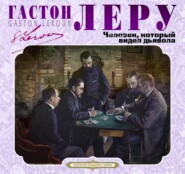По всем вопросам обращайтесь на: info@litportal.ru
(©) 2003-2024.
✖
The Double Life
Автор
Год написания книги
2018
Настройки чтения
Размер шрифта
Высота строк
Поля
Adolphe turned around to reprove Marceline for her flippancy, but at this moment M. Milfroid, the Commissioner of Police, approached, and Adolphe rose to greet his friend.
Adolphe introduced M. Milfroid to M. and Mme. Longuet. He was a man of about forty years of age, elegantly dressed, immaculate gloves, a silvery ringlet of hair on the white forehead. He advanced, smiling and bowing.
“We have often heard our friend M. Adolphe speak of you,” said Marceline. “Your fame has gone before you.”
“Oh, madame, I have known you for a long time. Every time I meet M. Lecamus he speaks to me of his friends of the Rue Gerauds, and in such terms that it has been my greatest desire to have the happiness of being presented to you.”
Marceline was conquered by such gallant manners. “I hear that you play the violin very well,” she said.
“I am equally interested in philosophy,” said M. Milfroid. “An interest which I owe to M. Adolphe, who is continually in dispute with me over the immortality of the soul, and other psychic matters. He has really made a convert of me.”
“Monsieur,” said Théophraste, who had not yet taken part in the conversation, “Adolphe and I like to converse about serious matters, also. We were just speaking of the relations between the soul and the body, and the different ways that the soul has of behaving with the body.”
“Ah!” said M. Milfroid, who desired to shine before Marceline, “are you able to distinguish between matter and mind, or the material and the spiritual? Matter and mind are the same thing in the eyes of science. That is to say, they constitute alike one unit, one force, produce at one time the phenomenon of cause and effect, tending to one end, the progressive steps of existence. You are the only ones, gentlemen, to still make that old distinction between matter and mind.”
After a while they rose and returned through the Place de la Concorde. At the entrance to the Rue Royale, there was a crowd of people, shouting and gesticulating. Théophraste, an old Parisian, wanted to know what was taking place, and flung himself into the crowd.
“Look out for pickpockets,” Marceline called to him.
“Oh, madame,” said Monsieur Milfroid, the Commissioner of Police, “there are no pickpockets when I am about.”
“It is true. We should be in no danger when you are here.”
“I do not know about that,” said Adolphe, looking about them. “My friend here appears more dangerous to me than all the pickpockets on earth.” At this they all laughed.
Théophraste made them wait ten minutes before he appeared, and then he announced that it was a coachman who had gotten his wheels locked with an automobile, and could not separate them.
Marceline felt annoyed at having been kept waiting so long on such a slight pretext. However, her thoughts were diverted in doing the honors of a hostess, and she invited M. Milfroid to dinner.
During the dinner many pleasantries were passed, and M. Milfroid excelled in complimenting Marceline.
Suddenly, he became uneasy, and plunging his hands in his pockets, looked vainly for his handkerchief. After a final and useless search, he passed his forefinger under his moustache, and sighed, declaring that it did not matter.
However, at that moment Théophraste wiped his mouth, and Marceline asked him where he had found such a beautiful handkerchief. M. Mil-froid at once recognized it as his own, and thinking it just a piece of pleasantry, took the handkerchief from Théophraste. However, feeling in his left side, he became pale and exclaimed, “Good God! I have lost my pocketbook. There were five hundred francs in it.” M. Milfroid did not regret losing the five hundred francs, but he found himself ridiculed by Adolphe, and Marceline teased him gently and laughed prettily. They were all poking fun at him, and this made him furious.
“M. Milfroid,” said Théophraste, “if you need any money for the evening I can lend it to you,” and he drew a wallet from his pocket. M. Milfroid uttered a cry: it was his! M. Milfroid took the wallet from him as he had done the handkerchief, and alleging numerous engagements, he took his leave. Before going down the stairs, he said to his friend Adolphe, who followed him, “These are nice kind of people you have introduced me to.”
When Adolphe returned to the dining-room, Théophraste was emptying his pockets. On the table there lay three watches, six handkerchiefs, several pocketbooks, containing large sums of money, and eighteen checks.
CHAPTER VIII
An Appeal for Help
THE important events of this story and its hero have occupied us to such an extent that we have not found time to present Monsieur Lecamus as he should be. The little that we know of him does not effect our sympathy. The place that he occupies in the house of Longuet, which is eminently immoral; the cynicism with which he deceives an innocent soul; the little danger that he seems to run in accomplishing the larceny- these are good reasons why we have deferred showing our contempt for him. It may be said that we have judged hastily, and have not allowed him to plead extenuating circumstances. The principal one, and the one which it would be well for us to dwell upon, is that he really liked Théophraste above everybody else. He loved him with his faults, his weaknesses, his ingenuousness, the confidence he had in him, and above all, the admiration Théophraste had for him. There was no sacrifice he would not make for Théophraste, and I daresay that if Théophraste had any pecuniary troubles, which after all are the only troubles which really count here below, Adolphe Lecamus would open his purse, and give to him freely. Adolphe loved Théophraste even above Marceline; and although I do not pretend to deal here with psychology, I find myself confronted with a case which is much less common than one would be inclined to believe. For Adolphe loved Marceline because he had made her his mistress.
If he had learned, by some supernatural warning, that Théophraste would some day learn his real position in the household, he would only have respected Marceline. “But,” he thought to himself, “Théophraste will never know anything about it, and as unknown evils do not exist, I will be the lover of the wife of my best friend.”
These lines are necessary, that the reader may understand properly the knavish tricks of the lover. But we must understand distinctly Adolphe’s devotion to Théophraste.
After the departure of the Commissioner, they all set themselves to consider what was to be done with the articles which Théophraste had brought home with him. At first they all sat silently looking at the objects, no one wishing to break the silence, until Théophraste said, “I have nothing more in my pockets. I really believe I have got my black plume.”
Marceline and Adolphe were startled by this, but still did not say anything, and waited for Théophraste to give some explanation. Then he declared it was in the crowd at the Place de la Concorde. He went in and out among the crowd, and it was a very simple matter for him.
“What must we do?” asked Adolphe in a grave voice?”
“What do you wish me to do?” replied Théophraste, who by this time had begun to confess. “You do not think that I am going to keep them! It is not my habit to keep things that do not belong to me. I am an honest man and have never wronged anybody. You must take them all to M. Milfroid, your friend, the Commissioner of Police. He can easily restore them to the owners.”
“What can I say to him?”
“Whatever you wish,” burst out Théophraste, who was becoming impatient. “Did the honest coachman who found a purse and fifty thousand francs in his carriage think about what he should say when he took them to the commissariat? He simply said, ‘I have found them in the carriage.’ That was sufficient. They even rewarded him for it. You must say, ‘My friend Longuet charged me to bring this to you. He found them in his pockets, and he does not wish a reward.’”
Marceline touched Adolphe with her foot under the table. This was her customary way of secretly drawing Adolphe’s attention. She wanted to signify to him that she thought Théophraste was demented, and her look quite showed it. Adolphe understood. He knitted his brows and scratched the tip of his nose. He felt that now was the time to act. He looked from Théophraste to the pocket-books, and coughing, said, “Théophraste, this is not natural. We have to explain ourselves. We must understand. You must not close your eyes to this misfortune. You must open them wide, and bring your will to fight it.”
“Of what misfortune are you speaking?” asked Théophraste, becoming frightened.
“Well, is it not a misfortune to have things in your pocket that do not belong to you?”
“I do not understand. You seem to be accusing me of being dishonest. I am an honest man, and whatever I have done dishonestly, I have done against my will.”
Having said these words, he fell back in his chair in a dead faint, and a deep silence fell over them all.
When Théophraste came out of his stupor, his eyes were full of tears. He motioned to his wife and his friend to come nearer to him. When they were beside him, he said, showing pitiable emotion, “I feel that Adolphe is right. A great misfortune menaces me, I know not what! I know not what! My God! I know not what! I know not what!”
Adolphe and Marceline attempted to console him, but he wept more. Then Marceline began to weep.
In his emotion, Théophraste grasped them both by the hand, and cried, “Swear never to abandon me, no matter what happens, for, oh! some day I shall need your help.” They swore to him in good faith.
Adolphe then asked to see the document. As he spread the document before him, he said, “Théophraste, tell me, do you ever have dreams?”
“It is very probable, but I only dream a very little.”
“Never?” insisted Adolphe.
“Scarcely ever. However, I remember to have dreamed four or five times in my life, perhaps because I woke each time in the middle of my dream, and it was always the same dream. But what possible interest can there be in this, to the subject which is occupying us now, Adolphe?”
Adolphe continued: “Dreams have never been explained by science. Science attributes them all to the effects of the imagination, but it does not give us the reason for these clear, distinct visions which appear to us sometimes. Thus it explains a thing which is not known by another which is no better understood. It says that dreams are the recollection of things which took place in a former life. But even admitting this solution-which is a doubtful one-we still have to find out what is the magic mirror that serves so well to keep the imprint of things. Moreover, how can one explain visions of real things, events that one has never seen in a former state, and of which one has never even thought? Who can affirm that these are not visions of retrospective past events in a former life?”
“That is right, my dear Adolphe,” said Théophraste, “and I ought to confess the things that I have dreamed. I have dreamed them three times as I said before, things that were perhaps true in the past, or will be in the future. I have never seen them in a waking state in my present life.”
“You understand me,” said Adolphe. “Relate to me the things that you have dreamed of and have never seen.”
“Oh, that will not take long. But so much the better, for it is not very cheerful: I dreamed that I was married to a woman named Marie Antoinette, and then–”
“And then?” interrupted Adolphe, who had never taken his eyes off the document.
“And then I cut her up in pieces.”
“Oh, horrors!” cried Marceline.
Adolphe introduced M. Milfroid to M. and Mme. Longuet. He was a man of about forty years of age, elegantly dressed, immaculate gloves, a silvery ringlet of hair on the white forehead. He advanced, smiling and bowing.
“We have often heard our friend M. Adolphe speak of you,” said Marceline. “Your fame has gone before you.”
“Oh, madame, I have known you for a long time. Every time I meet M. Lecamus he speaks to me of his friends of the Rue Gerauds, and in such terms that it has been my greatest desire to have the happiness of being presented to you.”
Marceline was conquered by such gallant manners. “I hear that you play the violin very well,” she said.
“I am equally interested in philosophy,” said M. Milfroid. “An interest which I owe to M. Adolphe, who is continually in dispute with me over the immortality of the soul, and other psychic matters. He has really made a convert of me.”
“Monsieur,” said Théophraste, who had not yet taken part in the conversation, “Adolphe and I like to converse about serious matters, also. We were just speaking of the relations between the soul and the body, and the different ways that the soul has of behaving with the body.”
“Ah!” said M. Milfroid, who desired to shine before Marceline, “are you able to distinguish between matter and mind, or the material and the spiritual? Matter and mind are the same thing in the eyes of science. That is to say, they constitute alike one unit, one force, produce at one time the phenomenon of cause and effect, tending to one end, the progressive steps of existence. You are the only ones, gentlemen, to still make that old distinction between matter and mind.”
After a while they rose and returned through the Place de la Concorde. At the entrance to the Rue Royale, there was a crowd of people, shouting and gesticulating. Théophraste, an old Parisian, wanted to know what was taking place, and flung himself into the crowd.
“Look out for pickpockets,” Marceline called to him.
“Oh, madame,” said Monsieur Milfroid, the Commissioner of Police, “there are no pickpockets when I am about.”
“It is true. We should be in no danger when you are here.”
“I do not know about that,” said Adolphe, looking about them. “My friend here appears more dangerous to me than all the pickpockets on earth.” At this they all laughed.
Théophraste made them wait ten minutes before he appeared, and then he announced that it was a coachman who had gotten his wheels locked with an automobile, and could not separate them.
Marceline felt annoyed at having been kept waiting so long on such a slight pretext. However, her thoughts were diverted in doing the honors of a hostess, and she invited M. Milfroid to dinner.
During the dinner many pleasantries were passed, and M. Milfroid excelled in complimenting Marceline.
Suddenly, he became uneasy, and plunging his hands in his pockets, looked vainly for his handkerchief. After a final and useless search, he passed his forefinger under his moustache, and sighed, declaring that it did not matter.
However, at that moment Théophraste wiped his mouth, and Marceline asked him where he had found such a beautiful handkerchief. M. Mil-froid at once recognized it as his own, and thinking it just a piece of pleasantry, took the handkerchief from Théophraste. However, feeling in his left side, he became pale and exclaimed, “Good God! I have lost my pocketbook. There were five hundred francs in it.” M. Milfroid did not regret losing the five hundred francs, but he found himself ridiculed by Adolphe, and Marceline teased him gently and laughed prettily. They were all poking fun at him, and this made him furious.
“M. Milfroid,” said Théophraste, “if you need any money for the evening I can lend it to you,” and he drew a wallet from his pocket. M. Milfroid uttered a cry: it was his! M. Milfroid took the wallet from him as he had done the handkerchief, and alleging numerous engagements, he took his leave. Before going down the stairs, he said to his friend Adolphe, who followed him, “These are nice kind of people you have introduced me to.”
When Adolphe returned to the dining-room, Théophraste was emptying his pockets. On the table there lay three watches, six handkerchiefs, several pocketbooks, containing large sums of money, and eighteen checks.
CHAPTER VIII
An Appeal for Help
THE important events of this story and its hero have occupied us to such an extent that we have not found time to present Monsieur Lecamus as he should be. The little that we know of him does not effect our sympathy. The place that he occupies in the house of Longuet, which is eminently immoral; the cynicism with which he deceives an innocent soul; the little danger that he seems to run in accomplishing the larceny- these are good reasons why we have deferred showing our contempt for him. It may be said that we have judged hastily, and have not allowed him to plead extenuating circumstances. The principal one, and the one which it would be well for us to dwell upon, is that he really liked Théophraste above everybody else. He loved him with his faults, his weaknesses, his ingenuousness, the confidence he had in him, and above all, the admiration Théophraste had for him. There was no sacrifice he would not make for Théophraste, and I daresay that if Théophraste had any pecuniary troubles, which after all are the only troubles which really count here below, Adolphe Lecamus would open his purse, and give to him freely. Adolphe loved Théophraste even above Marceline; and although I do not pretend to deal here with psychology, I find myself confronted with a case which is much less common than one would be inclined to believe. For Adolphe loved Marceline because he had made her his mistress.
If he had learned, by some supernatural warning, that Théophraste would some day learn his real position in the household, he would only have respected Marceline. “But,” he thought to himself, “Théophraste will never know anything about it, and as unknown evils do not exist, I will be the lover of the wife of my best friend.”
These lines are necessary, that the reader may understand properly the knavish tricks of the lover. But we must understand distinctly Adolphe’s devotion to Théophraste.
After the departure of the Commissioner, they all set themselves to consider what was to be done with the articles which Théophraste had brought home with him. At first they all sat silently looking at the objects, no one wishing to break the silence, until Théophraste said, “I have nothing more in my pockets. I really believe I have got my black plume.”
Marceline and Adolphe were startled by this, but still did not say anything, and waited for Théophraste to give some explanation. Then he declared it was in the crowd at the Place de la Concorde. He went in and out among the crowd, and it was a very simple matter for him.
“What must we do?” asked Adolphe in a grave voice?”
“What do you wish me to do?” replied Théophraste, who by this time had begun to confess. “You do not think that I am going to keep them! It is not my habit to keep things that do not belong to me. I am an honest man and have never wronged anybody. You must take them all to M. Milfroid, your friend, the Commissioner of Police. He can easily restore them to the owners.”
“What can I say to him?”
“Whatever you wish,” burst out Théophraste, who was becoming impatient. “Did the honest coachman who found a purse and fifty thousand francs in his carriage think about what he should say when he took them to the commissariat? He simply said, ‘I have found them in the carriage.’ That was sufficient. They even rewarded him for it. You must say, ‘My friend Longuet charged me to bring this to you. He found them in his pockets, and he does not wish a reward.’”
Marceline touched Adolphe with her foot under the table. This was her customary way of secretly drawing Adolphe’s attention. She wanted to signify to him that she thought Théophraste was demented, and her look quite showed it. Adolphe understood. He knitted his brows and scratched the tip of his nose. He felt that now was the time to act. He looked from Théophraste to the pocket-books, and coughing, said, “Théophraste, this is not natural. We have to explain ourselves. We must understand. You must not close your eyes to this misfortune. You must open them wide, and bring your will to fight it.”
“Of what misfortune are you speaking?” asked Théophraste, becoming frightened.
“Well, is it not a misfortune to have things in your pocket that do not belong to you?”
“I do not understand. You seem to be accusing me of being dishonest. I am an honest man, and whatever I have done dishonestly, I have done against my will.”
Having said these words, he fell back in his chair in a dead faint, and a deep silence fell over them all.
When Théophraste came out of his stupor, his eyes were full of tears. He motioned to his wife and his friend to come nearer to him. When they were beside him, he said, showing pitiable emotion, “I feel that Adolphe is right. A great misfortune menaces me, I know not what! I know not what! My God! I know not what! I know not what!”
Adolphe and Marceline attempted to console him, but he wept more. Then Marceline began to weep.
In his emotion, Théophraste grasped them both by the hand, and cried, “Swear never to abandon me, no matter what happens, for, oh! some day I shall need your help.” They swore to him in good faith.
Adolphe then asked to see the document. As he spread the document before him, he said, “Théophraste, tell me, do you ever have dreams?”
“It is very probable, but I only dream a very little.”
“Never?” insisted Adolphe.
“Scarcely ever. However, I remember to have dreamed four or five times in my life, perhaps because I woke each time in the middle of my dream, and it was always the same dream. But what possible interest can there be in this, to the subject which is occupying us now, Adolphe?”
Adolphe continued: “Dreams have never been explained by science. Science attributes them all to the effects of the imagination, but it does not give us the reason for these clear, distinct visions which appear to us sometimes. Thus it explains a thing which is not known by another which is no better understood. It says that dreams are the recollection of things which took place in a former life. But even admitting this solution-which is a doubtful one-we still have to find out what is the magic mirror that serves so well to keep the imprint of things. Moreover, how can one explain visions of real things, events that one has never seen in a former state, and of which one has never even thought? Who can affirm that these are not visions of retrospective past events in a former life?”
“That is right, my dear Adolphe,” said Théophraste, “and I ought to confess the things that I have dreamed. I have dreamed them three times as I said before, things that were perhaps true in the past, or will be in the future. I have never seen them in a waking state in my present life.”
“You understand me,” said Adolphe. “Relate to me the things that you have dreamed of and have never seen.”
“Oh, that will not take long. But so much the better, for it is not very cheerful: I dreamed that I was married to a woman named Marie Antoinette, and then–”
“And then?” interrupted Adolphe, who had never taken his eyes off the document.
“And then I cut her up in pieces.”
“Oh, horrors!” cried Marceline.





